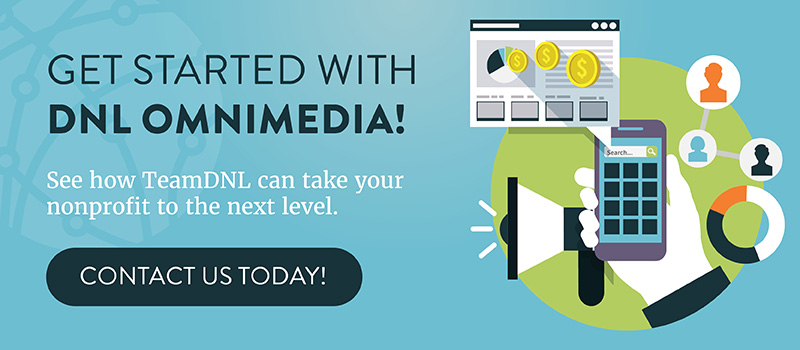
For many nonprofits, it would be impossible to operate without powerful technology.
Just think about it: an organization like yours relies on all different types of solutions in order to run their office, raise funds for their cause, plan events and campaigns, and (perhaps most importantly) interact and engage with supporters and potential new donors.
While essential, nonprofit technology is not always simple. In fact, the process of purchasing, implementing, learning, and using a complex nonprofit software system can be a complicated, time-consuming undertaking — especially if you go it alone!
That’s why so many organizations choose to work with a qualified nonprofit technology consultant who can help them design clear strategies for how they’ll leverage tech for smarter, more efficient fundraising.
If you’re taking on a new tech project or looking to improve your processes, you might be wondering if it’s the right time to bring in the experts. In this post, we’ll walk through 5 common scenarios nonprofits may experience that are perfectly suited for a nonprofit technology consultant.
We’ll explore how consultants can help when…
- You’re looking to implement new nonprofit technology.
- You want to integrate multiple pieces of nonprofit software.
- Your nonprofit software doesn’t have the functionality you need.
- Your nonprofit staff isn’t maximizing your technology.
- You don’t have a nonprofit data management or analytics strategy.
Of course, different consulting firms will have varying specialties and areas of expertise, particularly when it comes to what types of software solutions they’re familiar with. While not every technology consultant will be well-matched for the scenarios this post touches on, we guarantee you can find a consulting team to assist with each of these important areas (such as the experts at DNL OmniMedia, of course!).

1. You’re Looking to Implement New Nonprofit Technology
What’s the issue?
Perhaps the most common reason why a nonprofit would seek out a nonprofit consulting team’s help, implementing new software can be a huge project.
Not only does technology implementation come with a lot of potential complications, but it’s also a high-stakes undertaking for most nonprofits.
Your team will be investing quite a bit of time and money into the new software, and it’s crucial that you’re up and running on your new platform in a speedy time frame so that you can get back to fundraising with as little downtime as possible.
You’ll need to consider all of the following steps to your implementation process (among others):
- Getting the buy-in from your staff and board. Because software is a major investment for most nonprofits, you’ll need to devise a strategy for appealing to your board and other key organizational stakeholders.
- Choosing the best software solution. Consider your organizational goals and software requirements to refine your search for the perfect vendor and product.
- Developing and customizing your technology. Unless you’re purchasing a small-scale, out-of-the-box solution, chances are that you’ll need to spend some time building on to your base software and configuring a custom product that meets all of your needs.
- Migrating data between systems. As you transfer from one system to the next, make sure you have a plan for how donor profiles and historical data will get from Point A to Point B.
- Introducing your staff to the new system. Getting your team up and running on your new software can be daunting, but you won’t be able to maximize your new solution unless everyone is on the same page with your solution’s new processes and best practices.
Because your software is so crucial to your operations (and success!), this is one area where you can’t afford to cut corners. Instead, find an expert team of consultants who can manage the implementation process and mitigate any risks from the get-go.
How can a nonprofit strategy consultant help?
Luckily, your nonprofit technology consultant can smooth the implementation process from beginning to end by providing support in a variety of ways.
For instance, your consulting team can:
- Serve as an external project manager for the entire process, thus removing any chance of department or organizational bias.
- Assess your current technology setup and determine your most important requirements and existing limitations.
- Recommend the right software solution for your nonprofit, factoring in your objectives, budget, experience level, and more.
- Use their development skills to build out a custom technology system that fits your goals.
- Deploy and test your solution to troubleshoot potential issues before they arise for your team.
The bottom line: your consultant can serve as the team lead for complex implementation projects that most nonprofits just aren’t equipped to manage in-house.
With their expertise on hand, you can continue focusing on the tasks that matter most for your cause and cut down on lost time during the implementation process.

2. You Want to Integrate Multiple Pieces of Nonprofit Software
What’s the issue?
Though there are plenty of end-to-end, do-it-all technology solutions, the truth is that most nonprofits don’t have the capacity for such a comprehensive set of features. 
Rather than purchasing a massive (not to mention, expensive) tool that offers features they’ll never use, organizations may choose to integrate a selection of complementary platforms to create a system that works for them.
For instance, you might select a nonprofit CRM to house all of your supporter profiles and then integrate a dedicated events management software, a matching gifts tool, or even a robust accounting platform. Since all nonprofit needs vary so greatly, these integrations can be crucial to give you the features you need.
Integration is often a necessary aspect of a nonprofit’s technology strategy, but that doesn’t mean it’s a seamless process. Once you’ve decided that integration is the best way to obtain the level of functionality you need from your technology, you’ll still need to consider the compatibility levels of the various products you hope to combine, plus other factors like data transfer, customization, and ongoing management.
Bonus: Integrating with the Blackbaud family of products? Check out Snowball Fundraising’s list of the top Blackbaud integrations out there to see which solutions are the most compatible.
How can a nonprofit strategy consultant help?
Just as a consultant can help you implement a singular piece of nonprofit software, they can also help you combine multiple platforms through integration.
In fact, integrations are often connected to the initial implementation process. As you work with your consultant to choose the right product to fit your software requirements, you might find that your fundraising or database software of choice still doesn’t fit every requirement your team laid out. At that point, your consultant can determine how a strategic integration can fill in the gaps and create a 360° system that’s uniquely tailored to your goals.
The right consulting team can do all of the following:
- Develop a custom integration. If your software of choice has an open API, your consulting team should have no problem building an integration that connects your platforms. Unless your nonprofit has a team of developers in-house, you’ll need a consulting partner who can tackle this task for you.
- Advise on integration options. You might know what your base software doesn’t offer, but do you know which product is the best fit for solving that problem? Your consultants can help you choose the best solution to integrate with your software in the most seamless way.
- Test your integrated solution. To make sure you don’t run into any hiccups down the line (like lost data, duplicate entries, or other errors), your consultant can test that all data flows directly and gets filed correctly into your database.
If your nonprofit is in need of integration support, you’ll be glad to know team DNL has a team of full-stack web developers ready to take your software system from an idea to reality. Contact us to learn more about how we can help you with your integration project today!

3. Your Nonprofit Software Doesn’t Have the Functionality You Need
What’s the issue?
Even with integrations, some nonprofits still don’t get everything they want from their software — particularly those nonprofits with complex needs and many concurrent programs or campaigns. 
If you’ve found yourself in that boat and aren’t sure how to proceed, look at it this way: would you rather adjust your goals to fit your technology’s capabilities, or adjust your technology to fir your goals? If you’re serious about your mission, option 2 is the obvious choice!
To expand your software to cover every corner of your efforts, custom development or configuration may be the best path forward.
While many lightweight software solutions can be used right out of the box, others actually require configuration on the front end in order to be used. Depending on the product, the configuration and customization process may be fairly straightforward or quite complicated.
On top of that, you might consider working with a development team to build out a completely unique solution to supplement your configured software. Though this will require more work during the implementation process, this type of functionality can majorly pay off when you end up with a fully custom software system that was (literally) built to ensure your team’s success.
How can a nonprofit strategy consultant help?
Unless your nonprofit has the development knowledge in-house to manage creating and implementing a custom software solution, you’ll need a technology consultant to lead the charge with this task.
Your consulting team can help customize your technology system by first helping you evaluate your nonprofit technology strategy. In order to determine where a custom development would fit in, your consultant will work with your team to assess where technology fits into your larger strategy. They’ll need to know:
- What platforms are you currently using?
- What are your fundraising or donor engagement objectives for this year?
- How does your software help you reach these goals?
- Does your software hinder your goals in any way?
From there, your consultant can either configure your existing system or plan out a new custom development based on your specific software requirements.
For an example of what these custom solutions might look like, check out DNL’s custom Blackbaud products! These pre-built customizations offer Blackbaud users additional functionality that doesn’t come with their core products.
However, unlike a standard integration, these developments are delivered to your nonprofit in a completely customized way. You can work with us to make sure you get exactly the features you need (and nothing more or less); plus, the solutions will be seamlessly integrated with your current setup and fully branded to your organization.

4. Your Nonprofit Staff Isn’t Maximizing Your Technology
What’s the issue?
Once you find (or build) a technology system that completely meets your needs, it’s equally important that you learn how to utilize your software to fulfill those needs and accomplish all of your goals. Unfortunately, many nonprofits aren’t actually seeing the full return on investment from their software because they aren’t making the most of all of its features! 
If you’re concerned you’re not getting everything you want from your technology, look inward before deciding it’s time for an overhaul. It might be time for an internal “audit” of sorts to check that your team is using the software in the most effective ways before choosing to upgrade solutions or move to a new system.
This issue is especially important for organizations who:
- Have recently moved to a new system or have implemented a new software solution.
- Have a variety of departments and users relying on their technology to perform role-related functions.
- Have brought on new staff or expanded their team.
- Are rolling out new campaigns or fundraising strategies that leverage technology in a new way.
- Haven’t revisited their data management policies or practices in over a year.
That said, virtually any organization can benefit from bringing on a consultant to help you assess your technology strategy and find ways to make your software more valuable than ever.
How can a nonprofit strategy consultant help?
The benefit of working with a multifaceted nonprofit strategy consultant is that they can help with much more than just your software; these experts can take an impartial look at your fundraising strategies and help you fine-tune your tactics through smarter use of your technology.
Specifically, your consultant can help with all of the following:
- Training. Though you can likely acquire basic product training from your vendor, a consultant can develop custom role-based training paths for all members of your team, tailored to your schedule and based on your goals for the software.
- Customized support. In addition to training, your consultant can also provide personalized support for your products to make sure you’re using the tools correctly and troubleshoot any issues that arise.
- Policies and best practices. From data entry to daily use and more, your consultant can help your team put together best practices and policy documentation to get your team on the same page with how to use your tools correctly.
- Campaign strategy. Based on their experience with your software, a consulting team can help you take advantage of all of your technology’s features to design (and carry out) a top-notch fundraising campaign.
As you’re searching for the right nonprofit strategy consulting firm, look for a team that’s well-versed in the products you’re using. That way, they can draw on their knowledge of your platforms to help you learn insider tips into using the tools for best results.

5. You Don’t Have a Nonprofit Data Management or Analytics Strategy
What’s the issue?
45% of nonprofits collect and store supporter data in some form of CRM or donor database according to this year’s Global NGO Online Technology Report. But here’s something you might not know: many nonprofits aren’t using that data in any meaningful way.
Without a plan for managing your donor data and analytics, nonprofits like yours risk overlooking valuable insights into who their donors are.
For just a glimpse into what we mean, ask yourself:
- What primary demographics make up your supporter base?
- What donation tools are most popular among your contributors? How do factors like age or giving level affect this?
- What pages on your website convert the most donors? What pages see the most traffic?
- Which of your fundraising campaigns have brought in the most donations? What marketing efforts supported these campaigns?
But trust us — there’s so much you could be learning from your data, you need an expert to guide you toward making the most sense from all of these different metrics.
How can a nonprofit strategy consultant help?
With a nonprofit consultant’s help, you can comb through your CRM’s wealth of data to learn more about who comprises your database and how you can interact with and appeal to them most effectively.
Your nonprofit consultant might play a variety of roles depending on your specific data management strategy. A few key areas include:
- Developing a Google Analytics strategy. If your nonprofit doesn’t yet utilize Google Analytics, your consultant can help set up your account and show you the basics of this invaluable tool. Through Analytics, you can measure the influence of your nonprofit’s website, social media channels, and email marketing on your fundraising and engagement strategy. Look into data around search traffic, donor and volunteer conversion rates, and much more to find out if your web presence is positively contributing to your overall success.
- Pulling custom reports. Whether in your CRM, Google Analytics, or another source, your consultant can navigate your software to generate custom reports and deliver insights into highly specific areas of your strategy. Even better, your consultant can actually interpret that data and work with you to develop a reactive strategy based on your progress thus far.
- Data benchmarking against other organizations. To measure your success in an objective way, a consultant can conduct data benchmarking against similar nonprofits in your sector. That way, you can see your fundraising performance and determine areas for improvement.
- Assessing (and/or implementing) your Google AdWords strategy. From helping you prepare your AdWords Grant application to choosing the right keywords, your strategy consultant can help you develop a Google Grant management strategy that maximizes your grant funding and draws qualified visitors to your site.
Because nonprofit analytics are so important, a great strategy consultant can customize their approach to data management based on your needs. With their help, you should be on your way to not only knowing your donors better, but knowing how to engage them better, too.
Want to learn more about nonprofit analytics? Team DNL has got you covered with our in-depth crash course to nonprofit analytics. Read the guide now!
If any of these scenarios ring a bell, it may be time to start the search process for a nonprofit strategy consultant who can lead your team down the path to success.
For more insight into nonprofit consulting, check out these resources from team DNL and other nonprofit technology experts:
- Nonprofit Technology Consulting: 6 Steps to Success. Want to know more about how nonprofit consulting works? In this post, we walk through the DNL OmniMedia consulting process to give you an idea of what matters most in the technology consulting experience.
- 9 Tips for Hiring the Right Salesforce Consultant. The consulting process can vary from vendor to vendor, so find an expert who knows your software like the back of their hands. If you’re looking for a Salesforce-specific consulting team, check out our post first!
- DonorSearch’s Top Fundraising Consultants. If you’re ready to dive into your search for the right consultant, check out the top consultants as recommended by DonorSearch. (Bonus: team DNL made the list.)



